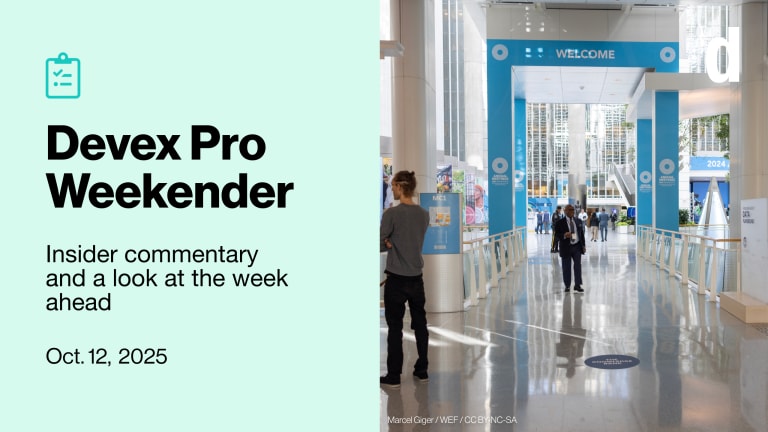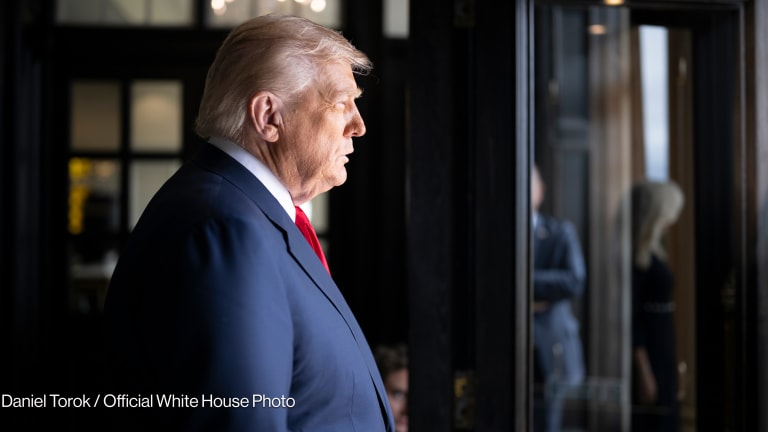This is a special Saturday edition of Devex Pro Insider from Senior Reporter Michael Igoe. For the next few months, this newsletter will tackle some of the biggest questions about the future of U.S. foreign aid, with insider reporting and analysis delivered straight to your inbox. Donald Trump’s presidential election victory last year sent the global development community scrambling to assess what it would mean for U.S. foreign aid. At this point, nearly six months into Trump’s second term, it’s fair to say we did not see this coming. While most expected the Trump administration to pursue aggressive foreign aid cuts, strip funding from “liberal” human rights and climate change causes, and even take aim at USAID’s contracting and NGO partners, few predicted the Elon Musk-engineered extinction-level event we have witnessed in the U.S. foreign aid sector since January. It begs the question: Were there signs along the way that went unnoticed? And are we still missing them? A red herring? In the lead-up to November’s election, one collection of policy proposals dominated the public conversation. The conservative Heritage Foundation’s Project 2025 blueprint put forward a detailed vision of U.S. aid reform that would have brought major changes to the operating models and ambitions of U.S. development agencies. The Project 2025 chapter that focused on U.S. foreign aid was authored by former political appointees from Trump's first administration. It proposed deep budget cuts, eliminated programming related to diversity, climate, and rights-based advocacy, and called for procurement reforms to diversify USAID’s NGO and contractor base. As this blueprint circulated inside the U.S. aid community, it caused plenty of alarm, with experts warning its recommendations would “completely redefine foreign aid as well as the liberal democracy agenda.” Project 2025’s aid proposals were regarded by some as a worst-case scenario that needed to be beaten back at all costs. In retrospect, it looks moderate in comparison to the wholesale dismantling of USAID and its workforce that has unfolded. The Project 2025 chapter was a bluntly conservative attack on the alleged liberal aid agenda — but it was also a set of highly technocratic proposals written by Beltway aid insiders. In the end — or rather, the beginning — that perspective did not win the day. Few, if any, of the document's authors have landed aid-related positions in the Trump administration, and the agency targeted for the blueprint’s most substantive reforms, USAID, no longer exists. It’s possible this will change. As I reported in a previous edition of this newsletter, the Project 2025 lead author, Max Primorac, is believed to be in the running for a high-level position at the State Department. But it’s also clear that Project 2025’s blueprint — and the contingent of conservative aid experts it represents — did not hold sway over decisions about U.S. foreign aid during the first weeks and months of this administration. If they didn’t hold that sway, who did? Background reads from 2024: • A US conservative's plan to beat the 'aid industrial complex' • Donald Trump won. What does that mean for development? A forgotten review There’s an easy answer to that question: Elon Musk. And it’s not wrong. As Jim Richardson, the former director of the Office of Foreign Assistance at the State Department, argued in a Devex Pro briefing last week, Trump was mostly a bystander to Musk’s personal crusade against an agency he derided as “criminal.” But it’s also not an entirely satisfying answer. It obscures a battle over foreign aid — and American global power writ large — that began before Musk entered the scene, and will likely persist after he has left it. Back in 2018, during Trump’s first administration, the U.S. aid community started sharing nervous rumors about a “foreign assistance review” that was supposedly poised to reshape U.S. development programs for better alignment with Trump’s “America First” agenda. As Trump previewed in his 2018 State of the Union address, the review sprang from an insistence that U.S. foreign aid should “only go to friends of America, not enemies of America.” It was expected to advocate for replacing aid grants with recoverable loans, to favor a focus on investments over projects, and to feed a White House appetite for “disruption.” That exercise ultimately withered on the vine of interagency conflict, losing an argument over how best to compete with China. At the time, moderate reformers such as former USAID Administrator Mark Green successfully advanced a “journey to self-reliance” framework that appealed to conservatives. In the end, the foreign assistance review was never publicly released. It was led by a National Security Council senior official named Kevin Harrington, who was not well known in the development community. Harrington was a Washington, D.C. outsider, better known as a close associate of Peter Thiel, the billionaire tech investor who co-founded PayPal with Elon Musk. Thiel has also become an iconoclastic intellectual associated with the so-called New Right political movement, who blends conservatism with Silicon Valley entrepreneurship and has helped fund the political careers of both Trump and his vice president, JD Vance. Even if the foreign assistance review did not bring about meaningful changes during Trump’s first term, its legacy might be more significant than we remember. It marked an early struggle between U.S. foreign policy insiders and an emerging group of anti-establishment outsiders over the shape and purpose of U.S. foreign assistance. The insiders appeared to win that round. Now, the balance of power may have shifted. Read: State Dept takeover of USAID is an 'impending train wreck,' experts say From 2018: The next battle for US aid is about to begin How to DOGE US foreign aid Thiel is also the co-founder of Palantir Technologies, the $300 billion software company known for selling data intelligence and surveillance tools to the U.S. military and national security agencies, supporting anti-terror operations and immigration enforcement — and for an eyebrow-raising partnership with the World Food Programme. On Jan. 10 of this year, 10 days prior to Trump’s inauguration, another Palantir co-founder, Joe Lonsdale, weighed in on the state of U.S. foreign aid on his personal Substack — and offered his own prescription for fixing it. That blog post was titled, “How to DOGE US Foreign Aid.” It was co-written with a Wall Street financier named Ben Black, who is now Trump’s nominee to lead the U.S. International Development Finance Corporation. “Much of our current foreign aid budget is waste and should be cut given our massive deficit,” Black and Lonsdale wrote. Their main argument was that the bulk of USAID’s budget should be shifted to a scaled-up DFC in pursuit of investments that advance “a long-term U.S.-centric development strategy,” rather than “pandering to the interest group-driven issue of the moment.” “By reducing mission drift and cutting NGO-capture - and making a profit for the American taxpayer - we can align US foreign aid with the rest of our new administration's priorities,” they wrote. At the time, their blog post flew under the radar. Now, with Black’s nomination and USAID’s evisceration, it reads like a preview of things to come. All the Palantir’s men Last month, Ben Black elaborated on his vision for DFC in testimony to the Senate Foreign Relations Committee, which was considering his nomination. Sitting next to him, offering his own testimony, was Jacob Helberg, Trump’s nominee for undersecretary of state for economic growth, energy, and the environment — or the E bureau. Previously, Helberg was the special adviser to the CEO of Palantir, Alex Karp. In his testimony, Helberg pledged that his State Department bureau would work together with DFC “to build the rails of a secure technology supply chain, anchored around flagship projects,” emphasizing that the focus would be on advancing “America’s economic security and growth, and American technological dominance abroad.” Under the reorganization proposal put forward by Secretary of State Marco Rubio, Helberg would also oversee the State Department’s global health security and diplomacy efforts, though these went unmentioned in his testimony. Sen. Jeanne Shaheen, a Democrat from New Hampshire, asked Helberg how he would ensure a continued focus on priorities, including global health. “The north star of the E Bureau moving forward will be economic security and economic statecraft,” Helberg said, adding that the priority will be to “use economics as a tool to advance security interests for the country.” Whatever final form the State Department takes, it seems inevitable that development will become an extension of strategic influence — less about empowering communities, more about protecting supply chains. ICYMI: Trump's DFC nominee stresses 'dual mandate' of US development finance Letter to shareholders One of the better encapsulations I’ve found of the worldview that is at work in these individual but interconnected examples is not, on its face, about U.S. foreign aid at all. It comes from Palantir’s latest shareholder letter, written by its CEO Alex Karp. But within the context of USAID’s dismantling, the jettisoning of the U.S. aid workforce, and rejection of many of its accepted ideals, it reads almost like a manifesto to explain actions that have often felt impulsive, unjustifiable, or even petty. “The establishment consensus had in recent decades moved towards a posture of skepticism of the American project and national identity,” it reads. “A belief in defending the United States and its interests was cast as regressive; the logic of this recent era has been that the nation should be allowed to wither, to die a natural death, and that our primary allegiance ought to be redirected to humanity as a whole. “The empathy for and interest in protecting the powerless and a ruthless pursuit of opportunity for all, no matter of high or low birth, that once defined a righteous and productive political movement has been set aside in favor of a performative politics—whose most zealous adherents are often more interested in signaling membership in a caste—that has turned off vast swaths of the public. “When there is no yardstick, no willingness to measure and quantify the success or failure of a political movement or policy, and no intellectual curiosity in assessing whether an ideology or worldview has delivered for its constituents, we must be willing to expose our purported shepherds as corrupt,” it continues. To be clear, there’s no conspiracy here. It’s simply that a contingent of Silicon Valley power brokers — many of them associated with a particular brand of conservative thinking — have brought an influential worldview to Washington’s foreign policy debate, and some of them are in positions to implement it. That has contributed to the atmosphere of disruption and destruction that characterizes the U.S. foreign aid system right now — in a way that is different from the disruption we might have expected from something like Project 2025. The call, in this case, is coming from outside the house. + The Trump effect: Explore our dedicated page to catch up on all the latest news, in-depth analysis, and exclusive insights on how the Trump administration’s policies are reshaping U.S. aid and global development.
This is a special Saturday edition of Devex Pro Insider from Senior Reporter Michael Igoe. For the next few months, this newsletter will tackle some of the biggest questions about the future of U.S. foreign aid, with insider reporting and analysis delivered straight to your inbox.
Donald Trump’s presidential election victory last year sent the global development community scrambling to assess what it would mean for U.S. foreign aid.
At this point, nearly six months into Trump’s second term, it’s fair to say we did not see this coming.
This story is forDevex Promembers
Unlock this story now with a 15-day free trial of Devex Pro.
With a Devex Pro subscription you'll get access to deeper analysis and exclusive insights from our reporters and analysts.
Start my free trialRequest a group subscriptionAlready a user? Sign in
Printing articles to share with others is a breach of our terms and conditions and copyright policy. Please use the sharing options on the left side of the article. Devex Pro members may share up to 10 articles per month using the Pro share tool ( ).
Search for articles
Most Read
- 1
- 2
- 3
- 4
- 5








